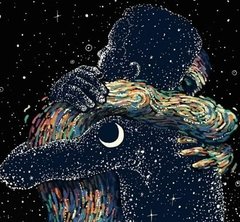-
Content count
313 -
Joined
-
Last visited
-
Days Won
1
About Giles
-
Rank
○
Recent Profile Visitors
3,142 profile views
-
This thing of ‘sublime eternal love’ is a possibility for human beings, and every human being should know that – it exists within each one of us. David Lynch Source: https://www.theguardian.com/music/article/2024/jul/26/sublime-eternal-love-exists-within-each-one-of-us-david-lynch-on-music-friendship-and-lifes-biggest-mystery
-
PREFACE Vijnanabhairava is a very ancient book on Yoga. It closely follows the basic principles of Saivagama. It contains 112 types of yoga. There is hardly any other book on yoga which has described so many ways of approach to Central Reality that is present in each man as his essential Self. It is both extensive, and intensive in the treatment of the subject of yoga. An English translation of this excellent work is being provided for the first time. The text that has been adopted is mainly the one that is published in the Kashmir Series of Texts and Studies. At a few places, however, slightly different readings yielding better sense have been incorporated as suggested by Svami Laksmana Joo. Each verse of the Sanskrit text has been printed in both Devanigari and Roman script. This is followed by an English translation and a number of expository notes which will go a long way in elucidating the main idea of the verse. A long Introduction explaining the basic principles of the yogas described in the text has been provided in the beginning. A glossary of technical terms has also been added at the end. Since the yogas recommended in the book are based on the tenets of the non-dualistic Saiva Philosophy, the reader will do well to read the author's Introductory Portion of either the Pratyabhijnahridayam or the Siva-sutras before taking up the study of the present book. I express my sincerest gratitude to Svami Laksmana Joo who has kindly taught this book to me word by word. My thanks are also due to Shri Dinanath Ganj who has kindly helped me in the preparation of the index to important Sanskrit words and the alphabetical index to the verses. Varanasi I. VI. 79 JAIDEVA SINGH
-
- meditation
- yoga
-
(and 8 more)
Tagged with:
-
Rupert Spira's sidekick. 🤣
-
I've just stated that:
-
I'm fully aware that it's "OK". If it wasn't, I wouldn't be doing it. That's certainly not my experience. Moksha is completely impersonal, as I've previously stated, several times.
-
😊👍🏻 😊👍🏻 😊👍🏻 Yes. I struggle with that myself, as evidenced by the fact that I'm still posting on a "spiritual" forum and I'm reading Forrest Knutson's latest book ATM. 🤣 I only stumbled across it recently myself & I was horrified to discover afterwards that she's one of the prime movers behind The Secret. Had I known that at the outset I wouldn't have bothered even to give it a second glance.
-
Just to clarify: this is perfectly normal for many people. It is not an attainment of any sort. It has nothing whatsoever to to with me (Giles). Furthermore, (albeit merely IMO/IME) most people pursuing a spiritual path would be infinitely better off if they dropped the goal of Self-realization, moksha, etc. along with the philosophical masturbation that almost invariably accompanies it and instead invested a few bucks in the new-age author Marci Shimoff's book Happy For No Reason.
-
About 40 years.
-
Of course not... It strikes me that you and I have very different experiences because mine is consistent with: Beyond caste, creed, family or lineage, That which is without name and form, beyond merit and demerit, That which is beyond space, time and sense-objects, You are that, God ItSelf. ~ Vivekachudamani ~ And yours appears to me to be something else entirely.
-
Luckily, I'd had a pretty good "mind cleanse" prior to encountering the cult that taught these practices. 🤣 No. I developed some later myself.
-
You may be interested to learn that he published a new book about a year ago entitled Mastering Meditation: Eight Steps From Beginner to Adept. I've just bought the Kindle version and started reading it. So far, so good, although I feel that he has a tenuous grasp of science at best and no expertise whatsoever in medical statistics.
-
Basically, it took about 18 months of ancient traditional meditation practices, which involved spending about 20 hours per week on the cushion. Prior to that I spent about 6 months doing preparatory practices (breath and mantra meditation) plus switching to a vegetarian diet and following the yamas & the niyamas.
-
Nirvikalpa: https://www.learnsanskrit.cc/translate?search=nirvikalpa&dir=au Samadhi is the eighth and final step on the path of yoga, as defined by Patanjali’s Yoga Sutras
-
That's interesting dwai. Before "my" (impersonal) Self-realization (of nirvikalpa samadhi), everything was trucking along just fine for me, as it does for many other unenlightened people. Self-realization made not an iota of difference to the enjoyment or to the practicalities of life for this jiva. For me and, I've repeatedly discovered, for many other people happiness without cause is just our default setting and, I've also discovered that it's pretty easy for anyone to access that default setting without bothering with the hassle of meditation, Self-inquiry etc., etc. And, FWIW, it never seemed to me, before or afterwards that Brahman was ignorant of its own true nature. The revelations for me were just that enlightenment is entirely impersonal, that Atman is indeed Brahman and that the fabric of creation is woven from Love.
-
Using the term Self-realisatin certainly works OK me too (although, unlike you apparently, I dont experience any emotional charge associated with the word enlightenment). 😊 So Brahman is ignorant of its own nature, which is SatChitAnanda (at least according to the basics of Advaita Vedanta)?








